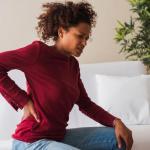
Just because uterine fibroids are benign, doesn’t mean that living with fibroids is no big deal. If you’ve ever had to cancel a date, fun plans with family, or a weekend away with your friends due to a heavy, painful period, we want you to know there’s help available. Of course, fibroid symptoms don’t only impact life’s special occasions. The day-to-day for individuals affected by fibroids can mean unpleasant routines such as:
- Regularly bleeding through sanitary pads
- Planning your days around being close to a bathroom
- Experiencing debilitating menstrual cramps
- Inability to exercise or perform daily tasks
If you’re tired of canceling plans every time you get your period, it’s probably time to look into fibroid treatment. At USA Fibroid Centers, we know that living with uterine fibroids can be a burden. We specialize in embolization of uterine fibroids, known as Uterine Fibroid Embolization (UFE).
What are Fibroids?
Uterine fibroids is a condition that affects millions of women during reproductive years. Fibroids are muscular growths that develop in or around the uterus. They can also develop outside the uterus on a stem. There are different types of fibroids found in the uterus:
- Intramural
- Subserosal
- Submucosal
- Predunculated
If you are living with uterine fibroids, they can present many painful and challenging symptoms such as:
- Heavy and prolonged menstrual bleeding that can continue for more than a week
- Frequent urination
- Pelvic pain and pressure
- Pain during sexual intercourse
- Back or leg pain
If the symptoms of fibroids are left untreated, they can lead to anemia (an iron deficiency) which can cause fatigue, weakness, and shortness of breath.
Living with uterine fibroids can affect your quality of work, social, and sex lives. Often, people with fibroids experience:
- Calling in sick to work for several days during their period
- Avoid going out or socializing because they are scared of getting their clothes blood-stained
- Find it hard to date or enjoy their sex life –– which can cause feelings of isolation and depression
- Avoid wearing any lighter colors due to the risk of bleeding
- Have a negative self-body image because of an enlarged abdomen
- Experience bloating
- Feel embarrassed to share their concerns and suffer silently in pain
Real Women Living with Fibroids Say:
Let’s face it ––there are few things more personal than your period. Many women simply don’t talk about it, or are too shy to ask even basic questions such as, should you use tampons with fibroids, or, is clotting normal? This can lead to misconceptions about normal period symptoms, and symptoms that could be indicating a serious, underlying health condition. Thankfully, with the use of innovative medical technology, we are able to provide a non-surgical treatment solution to women suffering from uterine fibroids.
Below are quotes from real women living with fibroids, sharing their experience with the hopes of educating and raising awareness on this easily treatable condition.
“There are so many days where I have to use sick time to stay home because I know that I am likely to get heavy clotting that will result in overflow. I often wake up in the middle of the night to find out that my tampon has leaked all over my bed. I can’t really go out during my period because I know I am going to bleed through my clothes or need to go to the bathroom every half hour to change my tampon just in case.” Jodie, 26
“I was constantly stressed out about my period. My flow was so heavy I had to set alarms during the middle of the night to change my pad, and my clothes would still get stained. I was going through 4, sometimes 5, pads a day.” Carly, 20
“The first day of my period I cancel all my activities and stay at home and bleed.” Sara, 26
“I am 37 and have an 11-year-old daughter. I stopped taking pills in January because my husband and I were trying to get pregnant. As soon as I stopped the pill, my period was heavy. I just ignored it because I thought it was just normal when you stop the pill. I experienced a sharp pain in my lower abdomen which went to my back. I went to the doctor to have an ultrasound to see what was going on and found out I had a 7cm fibroid. I am so frustrated because I have anemia as well.” Shie, 37
“I am a 39-year-old female and have had problems with menstrual bleeding since I was in my early 20s. I became pregnant in April of 2009, and I had a miscarriage at 7 ½ weeks. In September of this 2019, I was told that the fibroids have returned, but just in the last two months the pain has increased. My husband and I are still trying to have a baby. So, I really don’t want to have surgery.” Faith, 39
Read More: Symptomatic Fibroids in the Spotlight
Are You Tired of Living with Uterine Fibroids?
Although many believe that hysterectomy is the only method available to reduce fibroid symptoms, this is not true. At USA Fibroid Centers, we offer an effective, non-surgical fibroid treatment called Uterine Fibroid Embolization.
During this procedure, our experts use a tiny image-guided catheter to block blood supply to the fibroid tumors, causing the tumor to shrink in size. This outpatient procedure is performed under local anesthesia, with a recovery time of one to two weeks. UFE can alleviate your symptoms while allowing your uterus to remain intact. After UFE, an average of 80% of patients experience symptom relief.
Our team has helped thousands of women living with fibroids suffering from heavy, painful and prolonged menstrual bleeding caused by symptomatic fibroids. If you’re tired of living with uterine fibroids, don’t hesitate to schedule a consultation. Treatments at USA Fibroid Centers are covered by Medicaid and most insurance plans, just give us a call if you need to verify.



